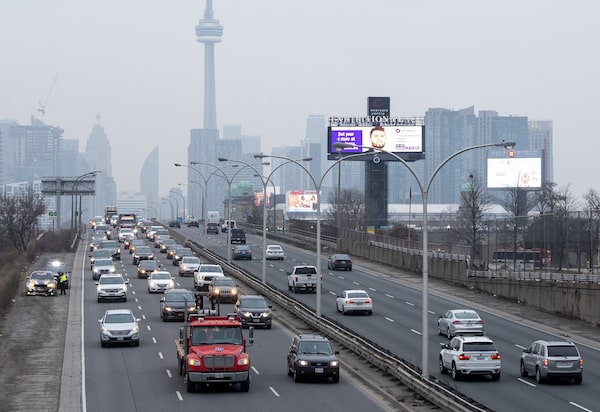
Heavy traffic leaves the downtown core in Toronto on Jan. 14, 2021. Auto insurers have begun adding a surcharge to the bills of customers who own vehicles that are frequently targeted by thieves.Frank Gunn/The Canadian Press
Auto insurers have started applying a surcharge of up to $500 to customers who own cars that are commonly stolen, as the industry grapples with skyrocketing rates of vehicle theft in recent years.
Daniel Ivans, an insurance expert with Ratesdotca, says a handful of insurance companies first started applying specific surcharges for owning these vehicles in the past couple of months. Recently, he received a notice from his own insurer that he’d face a charge for his 2019 Toyota Tacoma unless he purchased enhanced security features.
Drivers can have the fee waived or partly reimbursed if they install a digital tracking system or anti-theft devices such as a steering wheel lock in their car.
Canadian auto insurers have been sounding the alarm about “national crisis” rates of vehicle theft in recent years. Équité Association reported that more cars were stolen in the first half of 2022 than all of 2020, and Canadian auto insurers lost more than $1-billion last year from stolen vehicles as organized crime rings pushed up car theft rates.
Explainer: A car is stolen every six minutes in Canada. Here’s how to protect your vehicle
Insurers say they’d like to see auto manufacturers and the Canadian government mandating more security features to make cars harder to steal, but in the meantime have passed on the cost to owners of commonly stolen vehicles.
The list of cars facing the charge varies between insurers, but they generally include SUV and pickup truck models from 2019 or newer. Some affected vehicles include the Honda CR-V, Jeep Wrangler, Jeep Grand Cherokee, Ford F-150 and certain models of Land Rover and Lexus SUVs. However, insurers have said the cars subject to this fee could change quickly.
Ratesdotca said only a handful of insurers have started applying the charge, including CAA Insurance, Gore Mutual Insurance and Aviva Insurance Company of Canada, but Mr. Ivans expects more to follow suit and for the charge to eventually exceed $500 if current auto theft levels continue.
Some of these companies are offering to install tracking devices for free or for a discount for clients with high-risk vehicles. Installation can sometimes cost up to $400.
Bryan Gast, vice-president of investigative services at Équité Association, says while trackers are good for recovery of stolen cars, they’re not as good for preventing theft in the first place. Rather, the onus should lie on car manufacturers and Transport Canada to make cars harder to steal.
Équité Association, a not-for-profit organization that assists in insurance fraud and crime investigations, is calling on Transport Canada to update Canada’s Federal Motor Vehicle Safety Regulations to adopt new safety standards set by UL Standards and Engagement.
The regulations have not been updated since 2007 – back when advanced technologies were not present in cars.
“Back in 2007, when those standards were adopted, considerations were not given to push-button start vehicles,” Mr. Gast said. “Criminals are now taking advantage of the outdated standards and are able to quickly exploit vulnerabilities in these new technologies.”
For example, electronic key fobs, keyless car starters and onboard diagnostic ports – a plug-in which allows mechanics to assess a car for repairs – are not included in the current safety standards auto manufacturers have to abide by.
“We need everybody to be following the same standards so every consumer – regardless of which manufacturer they choose – is protected,” Mr. Gast said.
Elliott Silverstein, director of government relations with CAA Insurance, also called on manufacturers to improve technical security standards.
Organized crime groups target debtors to participate in car theft, police say
He said solutions could involve changes to a vehicle’s computer system or ignition system, or even implementing two-factor authentication, which has already become a common requirement for logging on to online accounts, to start a car.
“These are forward-thinking ideas, but these conversations need to be had because we cannot have thefts continue to happen at the rate it’s happening,” Mr. Silverstein said.
Meanwhile, Mr. Gast has said some consumers could be put off by the idea of installing a system that tracks every movement of their vehicle, but typically insurance companies monitor locations only once the vehicle is stolen.
Aviva said it has been offering the installation of tracking systems to clients with cars at high risk of theft since February, and roughly 25 per cent to 30 per cent of customers have accepted them.
“Vehicle manufacturers, owners, the insurance industry, law enforcement and government all need to work together to protect Canadians and solve this crisis,” Aviva spokesperson Hazel Tan said.